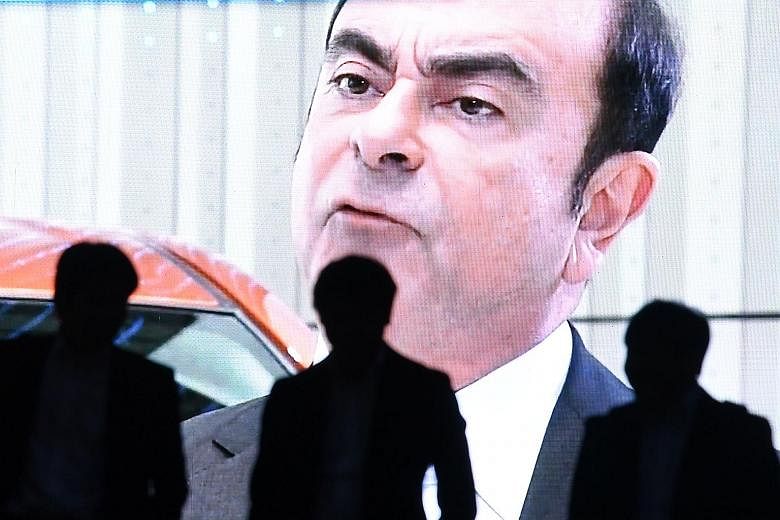PARIS • Tensions between Nissan Motor and Renault SA over the future of their carmaking partnership have exploded into the open as the downfall of chairman Carlos Ghosn roils the automotive industry and his top lieutenant, Mr Hiroto Saikawa, moves to consolidate power in his absence.
The two companies, which are connected via a complex structure of cross-shareholdings and joint manufacturing, have drastically differed in their reactions to Mr Ghosn's arrest in Japan on suspicion of financial offences.
On Tuesday night in Paris, Renault's board stopped short of firing the French-Brazilian executive, and asked Nissan to hand over details of his alleged misdeeds.
Nissan, by contrast, said after he was detained on Monday that it intends to dismiss Mr Ghosn, 64, as chairman - acting with a haste that has fuelled open speculation that he was the victim of a coup by Mr Saikawa, who serves as Nissan's chief executive officer, and others opposed to deeper integration between the two companies.
Nissan's board will meet today to make a formal decision on Mr Ghosn's future. For its part, Renault's board indicated that it was in the dark about the details of the allegations against Mr Ghosn.
"At this stage, the board is unable to comment on the evidence seemingly gathered against Mr Ghosn by Nissan and the Japanese judicial authorities," it said in a statement.
Mr Ghosn, who was among the best-paid executives in both France and Japan, stands accused of under-reporting income of about US$44 million (S$60.5 million) and misusing company funds at Nissan.
According to NHK, Nissan paid "huge sums" towards Mr Ghosn's residences in four global cities, payments that the broadcaster said lacked a business justification, and also covered the cost of vacations for his family.
Mr Ghosn has not commented on any of the allegations, or been seen in public since his arrest.
"Japan will not tolerate executive greed. And enriching for your own personal wealth - and this superstar mentality where the CEO gets paid 20, 25 times what the average worker gets paid - Japan does not want to tolerate," Mr Jesper Koll, the CEO of fund manager WisdomTree Investments, said in an interview with Bloomberg Television.
"There is no question Carlos Ghosn is being used as a symbol to ensure that corporate leadership in Japan will stay close to its workers."
Japan's legal system is opaque even to locals, and basic details of Mr Ghosn's location and immediate future are unknown, although he is likely at a detention facility in northern Tokyo.
Bail cannot be granted until prosecutors decide whether to proceed with an indictment, a process that could take weeks, and Mr Ghosn will not necessarily be joined by an attorney when he is questioned during that time. Prosecutors yesterday received court approval to hold him for another 10 days, the Kyodo newswire reported.
More than Mr Ghosn's personal future is at stake. The charismatic executive led both Nissan and Renault as well as their wider alliance, which unites the iconic French and Japanese companies with the smaller Mitsubishi Motors.
He had worked towards a merger of the companies to solidify their two-decade-old relationship, a union that would be a rival to Volkswagen and Toyota Motor for the title of the world's largest carmaker.
But Mr Saikawa publicly played down that prospect earlier this year, prompting a private rebuke from Mr Ghosn, his one-time mentor, who warned his Japanese colleague that his comments risked undermining Nissan's credibility, according to a person with knowledge of the exchange.
Renault owns a 43 per cent voting stake in Nissan, which owns just 15 per cent of Renault - without voting rights.
BLOOMBERG

